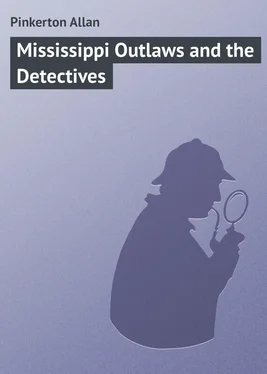Allan Pinkerton - Mississippi Outlaws and the Detectives
Здесь есть возможность читать онлайн «Allan Pinkerton - Mississippi Outlaws and the Detectives» — ознакомительный отрывок электронной книги совершенно бесплатно, а после прочтения отрывка купить полную версию. В некоторых случаях можно слушать аудио, скачать через торрент в формате fb2 и присутствует краткое содержание. Жанр: Классический детектив, foreign_detective, foreign_prose, foreign_language, на английском языке. Описание произведения, (предисловие) а так же отзывы посетителей доступны на портале библиотеки ЛибКат.
- Название:Mississippi Outlaws and the Detectives
- Автор:
- Жанр:
- Год:неизвестен
- ISBN:нет данных
- Рейтинг книги:3 / 5. Голосов: 1
-
Избранное:Добавить в избранное
- Отзывы:
-
Ваша оценка:
- 60
- 1
- 2
- 3
- 4
- 5
Mississippi Outlaws and the Detectives: краткое содержание, описание и аннотация
Предлагаем к чтению аннотацию, описание, краткое содержание или предисловие (зависит от того, что написал сам автор книги «Mississippi Outlaws and the Detectives»). Если вы не нашли необходимую информацию о книге — напишите в комментариях, мы постараемся отыскать её.
Mississippi Outlaws and the Detectives — читать онлайн ознакомительный отрывок
Ниже представлен текст книги, разбитый по страницам. Система сохранения места последней прочитанной страницы, позволяет с удобством читать онлайн бесплатно книгу «Mississippi Outlaws and the Detectives», без необходимости каждый раз заново искать на чём Вы остановились. Поставьте закладку, и сможете в любой момент перейти на страницу, на которой закончили чтение.
Интервал:
Закладка:
William learned that the young man who had first slipped out was Barton, and the man who had done the shooting was Russell. Clark, they said, had taken the steamer for Cape Girardeau, Missouri, two days before, accompanied by a married woman, named Slaughter. The description of the train robbers tallied so well with the appearance of Barton and Russell, that, taking their actions into consideration, there could no longer be any doubt of their complicity in the affair, and it was highly provoking that these two should have escaped. Still, it was an accident which could hardly have been avoided. The fact that the express company would not consent to the employment of a larger force of detectives was the principal cause of this misfortune, for it could have been prevented easily, had William been accompanied by two more good men of my force.
As it was, two detectives, dropping unexpectedly upon a nest of five villainous-looking men in the dark, could have hardly hoped to do better than to secure three of them. It could not have been supposed that they would know which were the important ones to capture, especially as they could not distinguish one from another in the uncertain light. Indeed, as afterward appeared, they were fortunate in having escaped alive, for the close approach to fatal wounds, which they both received, showed how deadly had been the intentions of the man Russell, while Burtine had evidently intended that they should never leave the house alive.
It may be supposed that the shooting on both sides was none of the best, but it must be remembered that it began without warning, and was over in two minutes. It cannot be expected that snap-shooting, even at close quarters, should be very accurate; yet it was afterward learned that Russell's escape had been about as narrow as William's, two balls having passed through his clothes and grazed his flesh.
CHAPTER IV
The Captured Ruffians are desired for Guides, but dare not join in the Search for the Outlaws. – One of the Robbers is Taken, but subsequently Escapes from the Amateur Detectives. – Another Clue suddenly Fails.
Having searched the whole place, and satisfied himself that the men captured had had no connection with the robbery or the robbers, William offered them one hundred dollars to act as guides through the cane-brake to arrest Barton and Russell. They said they could not if they would, since no man could find his way there in broad daylight, much less at night. They further admitted that they dare not attempt it, as Russell would kill them if they learned of their action. It was now pitch dark, and after a vain attempt to beat through the cane in search of the fugitives, William decided to return to Mr. Merrick's until next day.
The next morning at daybreak he started back for Lester's, accompanied by a number of the cane-brake population, all of whom were anxious to secure the one hundred dollars reward. They had long suspected the men at the store of being desperadoes, but they had had a wholesome fear of them on account of their fierce ways and their reckless habit of drawing their revolvers on slight provocation.
On arriving at Lester's, the party found that Lester had returned from Hickman during the night. He was a treacherous-looking scoundrel, and his reputation was bad, although he had never been caught in any crime in that vicinity. His name, John Wesley Lester, showed that he must have once belonged to a pious Methodist family, and, indeed, he claimed to have once been a Methodist preacher himself. He had sunken eyes, milky white, and his hair was lank and long; his complexion was dark, cheeks hollow, chin pointed, and forehead low. His manner was fawning and obsequious to those above him, and he looked and acted like a second "Uriah Heap." He pretended to know nothing of Russell, Clark, and Barton, except that they had come to his place in July, built the store there, and had been around the landing more or less ever since. He said that he knew nothing against them, except that they were gamblers, and that they often went off on gambling excursions, during one of which, according to their own statements, they had killed a man in a quarrel.
William learned from Lester's daughter that Barton had returned during the night to get a shawl, blanket, and two shot-guns. He had told her that Russell was hurt pretty badly, but that they intended to take the first packet down the river. From other parties William learned that the packet Julia had passed down during the night, and had stopped at a point about seven miles below, having been hailed from the bank. He did not place much faith in the theory that the men had taken passage by the Julia, for the reason that Lester's girl was too anxious to tell the story of the route Barton proposed taking. He discovered that Barton had been paying lover-like attentions to the girl, and he believed that Barton had instructed her to say that he intended taking the next packet, in order to give them a false scent. Having set the men of the neighborhood at work searching for Russell and Barton, William returned to Union City.
From Hickman Connell was sent to Cape Girardeau, Missouri, to capture Clark, who was said to have gone there three days before.
On the arrival of William in Union City, the superintendent telegraphed to me the result of William's visit to Lester's Landing, and authorized me to send an operative to Farmington, Illinois, to hunt up Mrs. Kate Graham, and learn what she could tell about Russell, Clark, and Barton. A man was sent there the next day, and he had no difficulty in finding Mrs. Graham, who proved to be the wife of a highly respectable business man. She was a member of the church, and was held in high esteem by every one acquainted with her. My agent, therefore, called upon her without any circumlocution or deception, and asked to see her on business. She was confined to her room by illness, but she saw him for a few minutes, and answered his questions so frankly that there was no doubt she was telling the truth. She stated that she was not acquainted with any one living at Lester's Landing; that she did not know, nor ever had known, any persons of the names given (Russell, Clark, and Barton); and that she knew no one who would answer to their descriptions. This clue seemed to come to an end very quickly, yet it afterward proved to be the means by which we captured one of the gang, and it was a striking instance of the necessity for the most careful and minute inquiry upon every point of news obtained, especially upon those received directly from the criminals themselves.
On the 3d of November, Connell went with a constable to the house of Mrs. Gully, the mother of Clark's companion, Mrs. Slaughter, and there he found them both. Clark was surprised by the officers, but he made a bold fight, and was overpowered with difficulty. When finally handcuffed and searched, a navy revolver and fifty dollars in money were taken from him; he was then taken nine miles on horseback to Cape Girardeau, where Connell obtained a light wagon to drive sixteen miles to Allenville, on the railroad leading to Hickman. On this trip Connell made the mistake of trusting to handcuffs alone, instead of securely fastening his prisoner's feet with rope. The idea that one man in handcuffs could escape from two active, unimpeded men did not, however, occur to Connell, and so the constable drove the horse, while Clark and Connell occupied the back seat. In justice to Connell, it should be stated that he had been constantly in the saddle for several days in raw and rainy weather, and had had very little sleep for two nights previous.
About nine o'clock in the evening, when only a mile from Allenville, Clark suddenly made a leap out of the wagon. The horse was jogging along at a good trot, and, though Connell sprang after his prisoner instantly, it was a couple of minutes before the constable could follow. As he ran, Connell fired at the dim figure disappearing in the thick brush; but the next instant he pitched headlong into a deep mud-hole, and, by the time he got out, the cylinder of his revolver was choked with mud, and Clark was far in advance. The chase was kept up as long as the pursuers were able to distinguish the direction of his flight, but, in the darkness of the gloomy woods, it was impossible to follow an athletic fellow like Clark with any hope of success. Connell returned to Union City very much crestfallen, and reported his misfortune. My first feeling, on learning the news, was one of deep regret and anxiety at the loss of one of the leaders of the gang; my second thought was one of profound thankfulness that my men were in no way responsible for it. The situation was an illustration of the disappointments and difficulties which are so often met in a detective's experience; and, though I felt somewhat discouraged, I was more than ever determined that none of these men should eventually escape, even though it should be necessary to follow them for months.
Читать дальшеИнтервал:
Закладка:
Похожие книги на «Mississippi Outlaws and the Detectives»
Представляем Вашему вниманию похожие книги на «Mississippi Outlaws and the Detectives» списком для выбора. Мы отобрали схожую по названию и смыслу литературу в надежде предоставить читателям больше вариантов отыскать новые, интересные, ещё непрочитанные произведения.
Обсуждение, отзывы о книге «Mississippi Outlaws and the Detectives» и просто собственные мнения читателей. Оставьте ваши комментарии, напишите, что Вы думаете о произведении, его смысле или главных героях. Укажите что конкретно понравилось, а что нет, и почему Вы так считаете.












